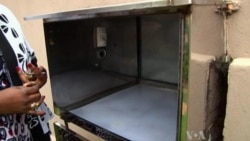JOHANNESBURG —
Every day, three babies, on average, are abandoned in Johannesburg alone. They are thrown into dumpsters and left for dead - often by desperate mothers who can't afford to raise them. Now, a local NGO called Door of Hope has opened what it calls a "baby bin." It allows mothers to leave their babies and know they will be taken care of.
In a small street in Berea, one of the poorest neighborhoods in Johannesburg, a trap door in a wall could be mistaken for a mailbox. But it's actually a place where mothers can safely leave their babies.
"Usually when they put the baby here, the mother who put the baby here, we have staff on duty there, we check in the camera, we see there is a baby, a staff member would come and fetch the baby," explained Francina Mphago.
Mphago says the bin has a mini-camera and a sensor. When a baby is put inside, a ringtone echoes in the organization's nursery, just a few meters behind the wall. Staff members can check the box on a computer screen.
The baby bin opened in 1999. At the time, desperate mothers were abandoning their babies in garbage cans, parks and in the streets of Johannesburg. Often it was too late to save them.
"I thought about it and wondered that if a woman wants to be anonymous, how can I help her? And so I thought that if I put a box in that wall, that they could put it in there instead of putting it in another rubbish bin," said Cheryl Allen, Door of Hope's director.
Since it opened, the baby bin has received 148 infants. Some have been adopted locally or by families abroad.
Godwill and Nkhangwe Kekana have adopted two sisters from Door Of Hope. While in their case, they know the mother's name, they say the stigma around anonymously abandoned children needs to be addressed, for the children's sake.
"I would prefer when the child grows, he knows his or her roots," Godwill stated. "But like I said, sometimes you don't know what really pushes the parents at that time to take that action."
"I think the society must start teaching the children who are adopted, you know sometimes to not concentrate much on the roots. They might say 'ok I'm grown up, I'm 18 years old, I don't even know where I come from.' But they must appreciate that they had life," Nkhangwe added. "At least somebody took them in, and gave them life."
Baby bins exist in other parts of the world but have often been surrounded by controversy. While some critics say they encourage women to abandon their babies.
Allen disagrees. She said, "I think that it doesn't encourage abandonment because they are going to abandon it anyway. Because I think it's quite a decision to make to abandon your baby. I don't think it's an easy decision. "
Over the years, other NGOs have followed Door of Hope and opened baby bins in other cities across South Africa.
In a small street in Berea, one of the poorest neighborhoods in Johannesburg, a trap door in a wall could be mistaken for a mailbox. But it's actually a place where mothers can safely leave their babies.
"Usually when they put the baby here, the mother who put the baby here, we have staff on duty there, we check in the camera, we see there is a baby, a staff member would come and fetch the baby," explained Francina Mphago.
Mphago says the bin has a mini-camera and a sensor. When a baby is put inside, a ringtone echoes in the organization's nursery, just a few meters behind the wall. Staff members can check the box on a computer screen.
The baby bin opened in 1999. At the time, desperate mothers were abandoning their babies in garbage cans, parks and in the streets of Johannesburg. Often it was too late to save them.
"I thought about it and wondered that if a woman wants to be anonymous, how can I help her? And so I thought that if I put a box in that wall, that they could put it in there instead of putting it in another rubbish bin," said Cheryl Allen, Door of Hope's director.
Since it opened, the baby bin has received 148 infants. Some have been adopted locally or by families abroad.
Godwill and Nkhangwe Kekana have adopted two sisters from Door Of Hope. While in their case, they know the mother's name, they say the stigma around anonymously abandoned children needs to be addressed, for the children's sake.
"I would prefer when the child grows, he knows his or her roots," Godwill stated. "But like I said, sometimes you don't know what really pushes the parents at that time to take that action."
"I think the society must start teaching the children who are adopted, you know sometimes to not concentrate much on the roots. They might say 'ok I'm grown up, I'm 18 years old, I don't even know where I come from.' But they must appreciate that they had life," Nkhangwe added. "At least somebody took them in, and gave them life."
Baby bins exist in other parts of the world but have often been surrounded by controversy. While some critics say they encourage women to abandon their babies.
Allen disagrees. She said, "I think that it doesn't encourage abandonment because they are going to abandon it anyway. Because I think it's quite a decision to make to abandon your baby. I don't think it's an easy decision. "
Over the years, other NGOs have followed Door of Hope and opened baby bins in other cities across South Africa.






